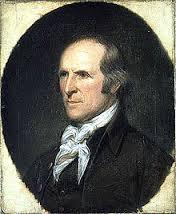But now in New England, where the local economy depended overwhelmingly on trade with England. In this conflict, in effect the opening skirmish of the War of 1812, New England’s sympathies lay with the British. The Federalists who controlled the state’s politics refused to convene a town meeting in Boston to condemn the attack on the Chesapeake.
This posed a severe dilemma to Senator John Quincy Adams, a leading Federalist. To Adams, who as a seven-year-old boy had watched the battle of Bunker Hill from a neighboring hilltop, the Federalist deference to trade and self-interest smacked of servility. Earlier that year, with British depredations against American shipping on the rise, Adams, alone among the Federalists, had voted for an embargo on British goods. Now he attended a town meeting in Boston called by Thomas Jefferson’s Republican party, and served on the committee which drew up a resolution condemning the naval assault.. The following day, Adams recorded that a friend had told him, “I should have my head taken off, for apostasy, by the federalists.” He had become a traitor to his class.

Timothy Pickering, Adams’ Federalist rival
Now both the U.S. and the British began to assume a war footing. In early 1808, the British Parliament authorized the seizure of neutral ships trading with France and its allies. The Congress responded by imposing a total embargo on trade with England—a catastrophe for New England. Adams, very reluctantly, voted for the embargo. Citizens across New England staged a spontaneous revolt: juries refused to convict merchants accused of violating trade restrictions. Adams was left defending a policy which his constituents despised, advanced by a President most of them loathed, and very unlikely, as he understood very well, to affect British behavior. (It didn’t.) He proposed one measure after another to soften the terms of the embargo; all failed.
On February 1, 1808, Adams’ kinsman and fellow Congressman Josiah Quincy, asked for a private meeting. “He said,” Adams recorded in his journal, “my principles were too pure for those with whom I was acting, and they would not thank me for them. I told him I did not want their thanks.” Quincy apparently believed, as many Federalists did, that Adams was currying favor with the Republicans preparatory to switching parties. How else to explain his bewildering behavior? Adams set his visitor to rights. War with England was coming, he said, and New England’s opposition to that war was bound to end “either in a Civil War, or in a dissolution of the Union with the Atlantic States in subserviency to Great-Britain.” To resist this dreadful prospect, Adams added dramatically, “I was ready if necessary to sacrifice every thing I have in life, and even life itself.”
Adams had sealed his doom. On February 16, Thomas Pickering, a hard-shell Federalist and Adams’ inveterate rival, published an open letter accusing Adams of doing Jefferson’s bidding, and Jefferson in turn of doing the bidding of the monster Napoleon. That was tantamount to treason.
Adams fired back with a 10,000-word open letter of his own. Pickering had called on the “commercial states” to refuse to enforce the embargo—that is, to defy the authority of the federal government. This was precisely the calamity Adams had forecast to Josiah Quincy. If New England can nullify a federal statute, Adams observed, so could the Southern states. How, then, would the Union stand? Here he anticipated by a full generation the argument over states’ rights and “nullification” which lead to the creation of the Confederacy. Adams denounced Pickering’s policy as craven surrender—and worse, self-defeating. “Submission,” Adams thundered, “never yet set boundaries to encroachment.” Perhaps war could not be avoided. “If we must perish,” Adams ringingly concluded, “let it be in defense of our RIGHTS.”
In May, the Massachusetts legislature selected a replacement for Adams—even though the latter’s term would not end for another year. Adams immediately wrote a letter of resignation. His career as a Federalist politician was over. He had been humiliated by his own party, but in later years he described the confrontation as one of the proudest moments of his life. Of course it did not end his career. Adams’ willingness—no, eagerness—to risk all for principle was, paradoxically, the source of the great achievements of his life.